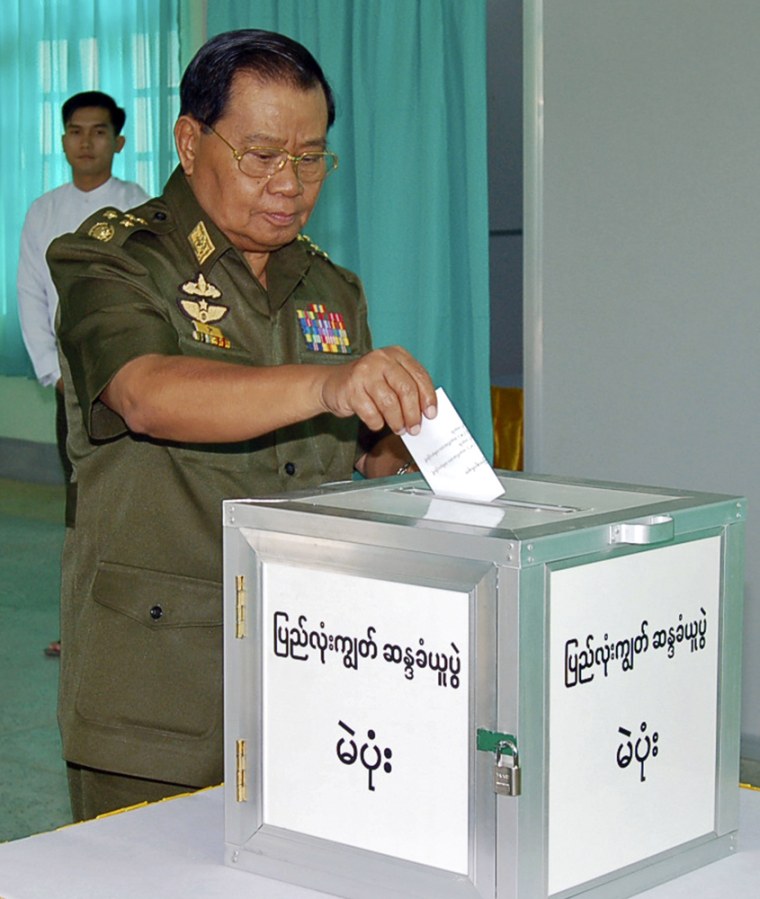From Burma's remote jungle capital of Naypyidaw, the image of life that emerges in official reports for the government's military rulers appears sunny. Economic growth in Burma has reached about 13 percent annually over the past five years, they say. Literacy is also soaring, with more than 96 percent of citizens able to read and write.
The erroneous statistics, described in a confidential report by a former top U.N. official, reflect the degree to which Burma's leaders have lost touch with the realities of a country that ranked below even its poorest neighbors on virtually every indicator. The statistics also shed light on the mind-set of a junta that has seemed paralyzed in the face of a recent cyclone that destroyed the country's main rice-producing region and has probably killed more than 100,000 people.
After 40 years of self-imposed isolation, Burma's military rulers preside over a bureaucracy that is incapable of making key decisions on its own. Even before the cyclone hit, civil servants were afraid to report "anything unpleasant about the country's socioeconomic and institutional conditions" up the military chain of command, according to an end-of-mission report last month by Charles Petrie, the top U.N. official in Burma from 2003 to 2007.
"This mutually strategic ignorance . . . can account to some extent for a number of disastrous economic and social policies," wrote Petrie, a French national who was expelled from Burma last year for criticizing the government's bloody crackdown against protests by Buddhist monks and opposition leaders. The findings of the U.N. report, obtained by The Washington Post, were first reported in the French daily Le Monde.
Since the cyclone struck, Burmese officials have refused to approve most visas requested by humanitarian aid workers. Airport workers have impounded international food shipments, awaiting permission to release them. And government officials have fended off requests from U.N. relief officials to allow Western navies -- whose support was critical in saving lives after the tsunami that hit southeast Asia in late 2004 -- to deliver aid.
Throughout the current crisis, the country's top generals have avoided contact with top U.N. officials and have sent mixed signals about their willingness to accept help. Faced with uncertainty, government bureaucrats have been unwilling to make basic decisions, such as approving visas, without the express permission of senior military leaders.
"The explanation we have been given was simply: This is a question we need to refer to higher authorities," said John Holmes, the U.N. chief humanitarian relief coordinator. Holmes has attributed the difficulties of the relief effort to the realities of dealing with "an isolated and suspicious regime."
Efforts by Holmes and U.N. Secretary General Ban Ki-moon to reach top Burmese officials, including Gen. Than Shwe, have failed.
On the brink of economic collapse
Petrie's report portrays a country on the brink of economic collapse in the months leading up to the cyclone. Burma's relationship with the U.N. relief community had worsened, with the Burmese government "constraining [U.N.] operations and harassing national staff," Petrie wrote in his 23-page report.
Burma's gross domestic product has fallen to just more than half that of Cambodia and Bangladesh, and 30 percent of children younger than 5 are malnourished, Petrie's report said. Rising food prices gobble up 80 percent of the average person's income.
Burma is facing a "silent humanitarian emergency," Petrie warned, adding that the government's "ruthless and bloody crackdown on the monks" who protested rising fuel prices last fall hardened public opinion against the junta, leaving citizens with "an even greater sense of anger, fear and despair."
The government is unwilling "to allow any information to be collected that could be politicized and used against it," Petrie reported. "As a result many of the statistics and performance indicators reported to the senior leadership by relevant government ministries . . . do not reflect the realities encountered on the ground in many parts of the country."
Little concern for the population
Petrie also reveals a high level of government callousness toward the population. "The relationship between the regime and the population is feudal at all levels," he wrote. "Consequently it is a ruling authority with little understanding and/or concern of the conditions in which the people live."
The primary focus of the rulers is to ensure unity in a country with 130 ethnic groups, many of which have fought the military -- dominated by the Bamar ethnic majority -- for six decades.
The report indicates that government ministers coordinating the current relief operation stand relatively low in Burma's military hierarchy. Burma's top two military officials -- Than Shwe and Vice Senior Gen. Maung Aye -- make every crucial decisions about the country's fate, and a group of 13 regional military commanders enjoys wide latitude to use force in the pursuit of security aims.
These regional military commanders resort systematically "to such grave human rights violations as torture, extrajudicial execution, rape and extremely abusive forms of forced labor," Petrie wrote.
